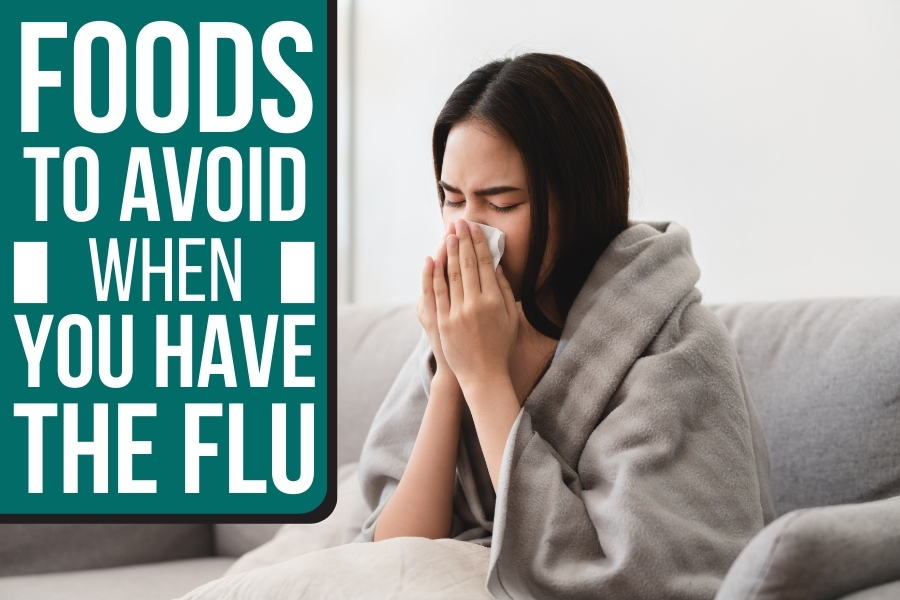Blog
Foods To Avoid When You Have The Flu
When the flu bug has you in its sniffling, sneezing grip, reaching for comfort foods might seem like a natural response. However, some foods can hinder recovery and make it harder for your body to fight the virus. If you’re feeling under the weather, it’s essential to choose your meals and snacks wisely and opt for foods packed with immune-boosting nutrients.
In this blog post, we’ll discuss some of the top foods to avoid when you have the flu and why they can harm your recovery. We’ll also discuss the importance of getting the flu vaccine and how certain healthy foods can help boost its efficacy.
The Importance of Getting the Flu Vaccine
The flu virus is highly contagious and can quickly spread from person to person. Therefore, everyone must get vaccinated and protect themselves and those around them.
Getting the flu vaccine helps prevent you from catching the virus and reduces the severity and duration of the symptoms if you get infected. It also helps prevent serious complications, especially in high-risk groups such as young children, seniors, and individuals with weakened immune systems.
At LaSalle Medical Associates, we offer flu vaccines to individuals of all ages to help keep our community healthy and protected during the flu season. Our staff will ensure you receive the correct vaccine for your age and health status and provide information on how to care for yourself post-vaccination.
Foods to Avoid When You Have the Flu
Processed Foods
Consuming processed foods increases your sodium, sugar, and unhealthy fat intake. These detrimental ingredients compromise your immune system and hinder your body’s ability to combat viruses. Additionally, these foods lack vital nutrients and antioxidants crucial for enhancing overall health and immunity.
Caffeine
Caffeine dehydrates the body, worsening the flu symptoms such as coughing, congestion, and sore throat. It also interferes with sleep quality, making it harder for your body to rest and recover.
Spicy Foods
Spicy foods can aggravate inflammation and worsen the flu symptoms like sore throat and congestion. They can also cause stomach upset and digestive issues, making it harder for your body to absorb essential nutrients from food.
Alcohol
Consuming alcohol can cause dehydration and weaken your immune system. It can also interfere with the effectiveness of certain medications you may take to relieve the flu symptoms. Moreover, drinking alcohol can make you feel worse and prolong your recovery time.
Sugary Foods and Drinks
Sugary foods and drinks can weaken the immune system and make it harder for your body to fight infections. They also lack essential nutrients for recovery and can worsen symptoms such as fatigue and body aches.
Fried Foods
Fried foods contain unhealthy fats that may contribute to inflammation, hindering your body’s ability to combat infections. They can also worsen digestive issues and lead to discomfort and bloating.
Acidic Foods
Foods with high acidity, like tomatoes, can aggravate throat irritation, intensifying soreness and discomfort. Additionally, they may induce acid reflux, resulting in heartburn and further discomfort.
Foods to Include In Your Diet When You Have the Flu
Soup-based Meals
Soup-based meals, such as chicken noodle soup or vegetable broth, are easy to digest and beneficial when you have the flu. They provide much-needed hydration and electrolytes, while the steam can help clear congestion and soothe a sore throat. Plus, the ingredients in soups can provide essential nutrients for recovery.
High Vitamin C Foods
Vitamin C boosts immunity and can help shorten the duration of a cold or the flu. Consume kiwis, oranges, bell peppers, broccoli, and other high-vitamin C foods to help your body fight the infection. Just be mindful of the acidity in some of these foods if you have a sore throat.
Garlic
Garlic has been used as a natural remedy for various illnesses, including the common cold and the flu. It contains compounds that can help boost immune function and fight off viruses and bacteria. Add garlic to your soups or meals, or make garlic tea by steeping chopped garlic in hot water.
Ginger
Similar to garlic, ginger has anti-inflammatory and immune-boosting properties. It can also help alleviate nausea, a common symptom of the flu. To enhance your soups, consider adding fresh ginger, or brew ginger tea by steeping sliced ginger in hot water.
Protein-rich Foods
When you have the flu, your body works hard to fight the virus. Protein-rich foods can give your body the necessary building blocks to repair and heal. Incorporate lean protein sources such as beans, chicken, fish, and lentils into your daily diet.
Related: What Foods are High in Protein?
Rest and Stay Hydrated
In addition to eating nourishing foods, it is essential to rest and stay hydrated when you have the flu. Rest allows your body to focus on fighting off the infection, while staying hydrated helps flush out toxins and moisten your mucus membranes, which can help alleviate congestion.
Have You Received the Flu Vaccine?
The flu season persists from October to May in the United States, with peak activity occurring in winter. The best way to prevent the flu is by receiving the annual flu vaccine. It is recommended for everyone over six months of age to receive the vaccine, especially those at high risk for complications from the flu, such as young children and older adults.
The vaccine contains inactive flu viruses that develop antibodies in your body to fight off the virus if you come into contact with it. This can significantly decrease your chances of catching the flu or reduce the severity of the symptoms.
LaSalle Medical Associates offers flu vaccine at multiple locations and encourages everyone to vaccinate annually. Our healthcare professionals can also provide additional information about the flu and answer any questions.
Contact us @ 855-349-6019 to schedule your flu vaccine appointment today. Don’t let the flu get you down. Stay healthy and protected with the annual flu vaccine.

